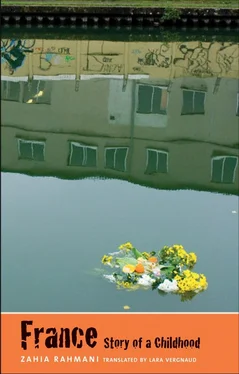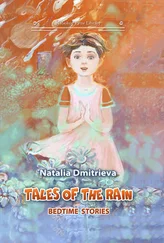Today you ask me for your kohl and the olive tree wand carved for you by a small boy in Algeria. I look for a long time and you smile when I hand it to you. You moisten it to outline your eyes. I turn away, hiding my sadness from you.
“Why are you crying?”
“Because of all the pain we inflict on children,” I tell you.
You smile at me.
In Algeria, you gave away my clothes.
You gave away our money.
You gave away the video camera.
You gave away the household linens.
You gave away the coffee, sugar, and sweets.
You gave away the spoons and knives.
You gave away your house.
You gave a son to your daughter.
You raised a German.
You married a widow to a widower.
You paid for gravestones.
You told your stories to poets.
You applied henna at baptisms.
You sang praises during celebrations.
You adopted a soothsayer.
You healed a mute child.
You gave a home to that alcoholic man until his death.
You sheltered the beaten child.
You gave a home to all the lost souls who knocked on your door, giving them our beds and our shoes.
You cried and prayed for a burned child so much that today he sings. Demanding your presence for all his joyful moments. Tomorrow he marries.
You saved lives over and over again, buying a workbench a cow some goats a car a machine a motor a workshop a tractor a grocery store and many other things that I don’t know about so that over there, in your country, those whom you know live decently. And through these lessons in generosity, you unknowingly granted us the best cure against unhappiness.
I kiss you then I leave so you can fall asleep. I go back to my attic room.
You won’t be able to surprise me here anymore as you did when I read Hocine’s abandoned books all night long. You would come upstairs noiselessly and tell me, “Go to sleep.”
“I’m not done.”
You never insisted.
Now that your legs will no longer carry you, it calms you to know I’m up here, watching over you in your old age. As a child, I ask you to never throw away my old papers. Disregarding your fixation with newness and freshness, I make you swear you’ll keep everything I want preserved. Your sons and I possess few things. But like all children we want toys. So we obtain them. And since they are rarely given to us as gifts, we use them with complete and careless abandon. Crushing and misplacing each dismantled piece in a corner of the top floor that has been transformed into an open playroom with no rules. You desperately try to clean it on countless occasions, regularly sweeping and emptying the room of all that seems used and pointless to you. You unapologetically throw away electric train tracks, Meccano parts, puzzle pieces, miniature cars, model bits, Monopoly money, dice, cards, tokens, cubes, Big Jim arms and legs, and every 45 single missing a sleeve. Time and again, you strip apart what seems like just an old stereo system to you. You keep the speakers and give the amp to an antiques dealer passing through who briefly becomes one of your allies. Your voluntary ignorance of all things technical, and of how children are raised here, quickly calms our tantrums. We’re convinced that this ignorance will empower you to repeat your actions. In our absence, during the afternoon while we’re at school, you let the antiques dealer go upstairs and take the object of his choice. One day, it’s the entire collection of photographs that disappears. Portraits of soldiers that the owners had pasted to the garret walls. You tell me, a little embarrassed, “I burned them.”
I don’t believe you.
“Do you know how much those are worth? Do you know what that man is going to make? Do you know?”
You don’t care. You strongly disapprove of those old images. Bodies frozen on paper that threaten to dethrone the ghost in your house. The Assass , as you call him in your language. A benevolent guardian who can’t share his home with the dead. “And they’re all dead,” you say. But for me, the photos and accompanying texts are how I understand part of France’s history. Most of them date from the Great War. Thinking back, I remember what people used to tell me about the former occupants of our house.
In 1973, we enter it for the first time. We go through the back, the garden. It’s overrun with tall, unpleasant vegetation. We clear a path of black earth all the way to the doorstep. In the house, unoccupied for the past twenty-five years, filth reigns as much as the smell of a faded, closed-up home. With the exception of the chimneys, the mirrors, and several delicate chandeliers in the hallways, emptiness and cold have set up camp. We count five faucets, a bidet, a tub, several bathrooms, six bedrooms, two living rooms, a dining room, two kitchens, including one for the summer, two adjoining rooms, an immense garage, and two attics. On the right, next to a small, covered courtyard, is another wing, a large building that contains the vestiges of a family business lifeless for more than half a century. We walk above horse stalls, crunching on flat bones, white, polished handles by the hundreds. Dozens of ripped cartons are thrown on top of them, spilling over with cut, gathered hairs so soft and silky that we pick them up by the armful. In this region once known for manufacturing brushes, the locals were hired to manually assemble the materials. They would do this work from home. Now that activity is gone. The stiff hairs molded to plastic have outlived the animal waste. We burn what remains and bury the bones. This goes on for days. The same for the brambles that pierce our skin before we reduce them to ashes. Everything is ruin and abandon. Many of the houses in the village are empty and for sale. Today, I would never be able to buy what cost my family years of work and incredible willpower. Everything here has increased in value. After a long erosion the walls were raised again. Witnesses to a decline, we were also the involuntary actors of change. We were there. We had to be. But what happened? How did we end up living alongside people so disillusioned by the future that their hearts had nearly stopped beating?
This abandon attracted my father. He couldn’t stand agitation, or what followed. After wars and prison, he no longer harbored any expectations. He refused company. It was also in this village that he would decide to put an end to his life.
The house has been unoccupied for a quarter of a century. A very sad fate looks in store for the structure, portended by the cost of repairs, but even more so by the decay overshadowing the place—all the badly kept, tangled vegetation, the skeletons of bygone activities, thrown here and there, the stockrooms in disrepair, and the imminent collapse of the walls. It’s the sole vestige of a bourgeois past that the villagers helped construct. A long piece of heavy and powerful iron is suspended over a high exposed wall, which is crumbling and unstable. The dilapidated and rusted mechanical arm could come loose at any moment and sweep away the construction bricks with it. At its base, layers of dried entrails cover the slabs of what was once a workshop. This is where they stretched, rolled, and powdered animal innards to make food casings. The local women would continue working the precut skins at home before adding a knot of red string on the side that they tightened with a clamp. They brought the finished product to a factory, which delivered them to a packaging plant. Back then people used to say, “I make sausage casings.” That work is gone too.
It was on the eve of the Great War that the owners became more prosperous. They added one floor to their home and constructed two lean-tos on the sides. We will use one as a garage and the other as a sanctum for prayer. You can read what happened next on the backs of the photographs we found in the attic. They represent men. Enlisted boys in the trenches. The cards were addressed to the master. Feigning to have forgotten they could die at any moment, the boys sent him accounts of a joyful camaraderie that implied the war they were fighting far from home was just that. A moment of brotherhood. Warding off certain death by avoiding the future, they always ended their letters with a respectful farewell to the man who, in their absence, had still employed their mothers, wives, and sisters. With fondest memories and my utmost respect. See you soon . Hopeful that at their return, life would carry on like before.
Читать дальше


![Джеффри Дивер - Where the Evidence Lies [A Lincoln Rhyme Short Story]](/books/403782/dzheffri-diver-where-the-evidence-lies-a-lincoln-r-thumb.webp)
![Джеймс Чейз - The Mirror in Room 22 [short story]](/books/421068/dzhejms-chejz-the-mirror-in-room-22-short-story-thumb.webp)








